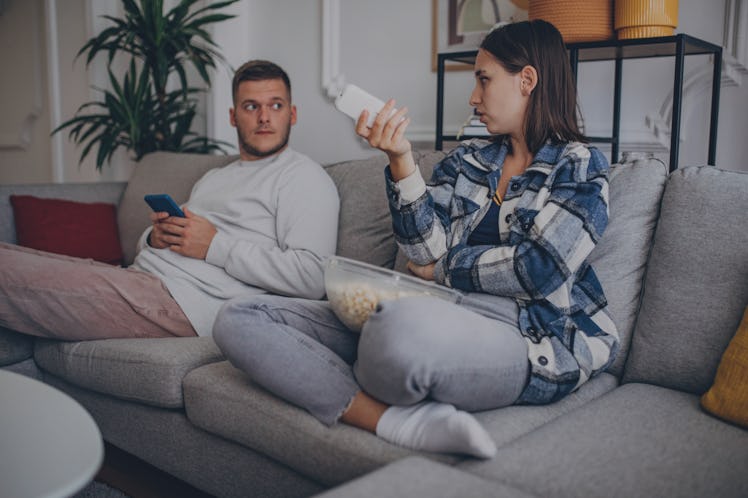“Phubbing” Hurts Relationships — But There’s An Obvious Fix
Why you should pay more attention to your partner and less attention to your phone.

When couples are together, it may be wise to turn off social media notifications or put the phones away altogether, a new study suggests. “Phubbing” — paying more attention to your phone than your partner — too much in relationships can devolve into a passive-aggressive techno spiral, at least according to a preliminary study published in Computers in Human Behavior.
Researchers who analyzed self-reported responses about partner behavior and relationship satisfaction from 75 participants found that phone snubbing — the practice known as “phubbing” — can negatively affect the partner who feels snubbed and compel them to retaliate.
Participants in the largely heterosexual and female panel were recruited through social media, online forums, and word of mouth. Requirements included living with a significant other who they had been in a romantic relationship with for at least six months. The average length of participants’ relationship was approximately eight years, and 29% of participants had children.
Most of the data points collected for the study were pulled from nine self-reported surveys that each participant completed. The study replicated findings of previous research that found on days in which perceptions of phubbing were high, participants reported significantly lower relationship satisfaction along with greater levels of anger, frustration, and jealousy.
But despite all of those negative feelings, it wasn’t retribution that drove people to retaliatory phubbing. It was boredom.
Without meaningful interaction, phubbees tended to turn their attention to their own devices and find engagement online. Partner buried in their phone? Might as well scroll through Instagram or catch up on what the Royal Family has been up to.
But despite the increase in negative feelings and retaliatory behaviors caused by phubbing, the study didn’t unearth any lasting adverse effects.
“Partner's inability to disengage from technology did not, however, influence relational conflict nor phubbees' individual well-being,” the study authors wrote. “Therefore, outcomes of being phubbed remain mixed: Phubbees do perceive lack of attention in face-to-face interactions negatively, but this may not have a significant long-lasting impact on the phubbee or the relationship.”
Unsurprisingly, clear communication was a factor in helping stem the tide of relational phubbing.
“Some individuals responded to partner phubbing by simply asking their partner what they were looking at,” researchers wrote. “By doing so, they may have mitigated any conflict from occurring.”
This being the first study to explore various retaliatory responses to phubbing using self-reporting, opportunities for future research include a multi-perspective approach that includes reporting from phubbers instead of only the phubees and utilizing more objective measures than self-reporting.
Regardless, putting the phone down and paying more attention to your significant other remains some of the most helpful relationship advice available.
This article was originally published on